
Eduard Charlemont Painting Reproductions 1 of 1
1848-1906
Austrian Academic Classicism Painter
Eduard Charlemont, born in Vienna in 1848, belongs to that special breed of artists who seem to be born with a brush in hand. Coming from a family steeped in art - his father a painter of miniatures, his brothers Hugo a fellow painter, and Theodor a sculptor - Charlemont’s path seemed inevitable. At just 15 years old, he exhibited for the first time at the Academy of Fine Arts in Vienna. Precocious doesn’t begin to cover it - not only was he showing his work at such a young age, but he was also hired to teach drawing at a girls' school, an early nod to his natural skill and artistic presence.
Charlemont’s early promise quickly blossomed into a full-fledged career. After his studies in Vienna, he embarked on a series of travels through Italy, Germany, and eventually settled in Paris, where he would remain for 30 years. Paris at the time was the beating heart of the art world, and Charlemont found his place there with ease. He won first prize at the prestigious Paris Salon several times, cementing his reputation as one of the most talented painters of his generation. It was here that he painted his most famous work, "The Guardian of the Seraglio" (better known as "The Moorish Chief"), a mesmerizing image of a Moorish swordsman standing guard, which became an icon in its own right.
Charlemont’s talents weren’t confined to the easel alone. He was a master of large-scale murals, contributing to the grand decorations of the Burgtheater in Vienna. Alongside his brother Hugo and other luminaries like the Klimt brothers, Charlemont helped create some of the most important public art of his time. His murals, spanning 55 meters in length, adorn the walls of the Austrian National Theatre, capturing the grandeur and sophistication of Vienna’s cultural life.
Yet, it’s "The Moorish Chief" that continues to captivate audiences today. This painting, housed in the Philadelphia Museum of Art, remains one of the most beloved and best-selling images from the museum's collection. Charlemont had an extraordinary ability to fuse the technical mastery of the Flemish painters with the drama and narrative of 17th-century genre scenes. His work exudes an old-world elegance while retaining a compelling immediacy. In his hands, history feels alive, and figures from centuries past seem to step out from the canvas, fully formed and utterly arresting.
Eduard Charlemont died in 1906, leaving behind a body of work that speaks not only to his technical brilliance but also to his deep understanding of history, portraiture, and the power of art to tell timeless stories. Today, his paintings stand as a testament to a bygone era, but they continue to resonate with modern audiences, capturing imaginations just as they did over a century ago.
Charlemont’s early promise quickly blossomed into a full-fledged career. After his studies in Vienna, he embarked on a series of travels through Italy, Germany, and eventually settled in Paris, where he would remain for 30 years. Paris at the time was the beating heart of the art world, and Charlemont found his place there with ease. He won first prize at the prestigious Paris Salon several times, cementing his reputation as one of the most talented painters of his generation. It was here that he painted his most famous work, "The Guardian of the Seraglio" (better known as "The Moorish Chief"), a mesmerizing image of a Moorish swordsman standing guard, which became an icon in its own right.
Charlemont’s talents weren’t confined to the easel alone. He was a master of large-scale murals, contributing to the grand decorations of the Burgtheater in Vienna. Alongside his brother Hugo and other luminaries like the Klimt brothers, Charlemont helped create some of the most important public art of his time. His murals, spanning 55 meters in length, adorn the walls of the Austrian National Theatre, capturing the grandeur and sophistication of Vienna’s cultural life.
Yet, it’s "The Moorish Chief" that continues to captivate audiences today. This painting, housed in the Philadelphia Museum of Art, remains one of the most beloved and best-selling images from the museum's collection. Charlemont had an extraordinary ability to fuse the technical mastery of the Flemish painters with the drama and narrative of 17th-century genre scenes. His work exudes an old-world elegance while retaining a compelling immediacy. In his hands, history feels alive, and figures from centuries past seem to step out from the canvas, fully formed and utterly arresting.
Eduard Charlemont died in 1906, leaving behind a body of work that speaks not only to his technical brilliance but also to his deep understanding of history, portraiture, and the power of art to tell timeless stories. Today, his paintings stand as a testament to a bygone era, but they continue to resonate with modern audiences, capturing imaginations just as they did over a century ago.
5 Eduard Charlemont Paintings
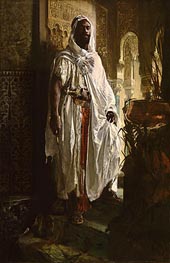
The Moorish Chief 1878
Oil Painting
$2221
$2221
Canvas Print
$61.75
$61.75
SKU: CHE-13418
Eduard Charlemont
Original Size: 150.2 x 97.8 cm
Philadelphia Museum of Art, Pennsylvania, USA
Eduard Charlemont
Original Size: 150.2 x 97.8 cm
Philadelphia Museum of Art, Pennsylvania, USA
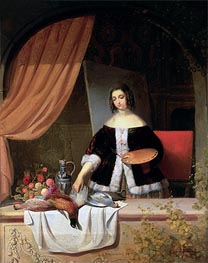
Arranging her Still Life 1884
Oil Painting
$1255
$1255
Canvas Print
$63.67
$63.67
SKU: CHE-13419
Eduard Charlemont
Original Size: 49 x 42 cm
Private Collection
Eduard Charlemont
Original Size: 49 x 42 cm
Private Collection
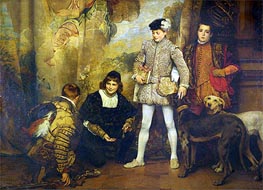
The Pages 1889
Oil Painting
$3793
$3793
Canvas Print
$67.55
$67.55
SKU: CHE-13420
Eduard Charlemont
Original Size: 190.5 x 279.4 cm
Private Collection
Eduard Charlemont
Original Size: 190.5 x 279.4 cm
Private Collection
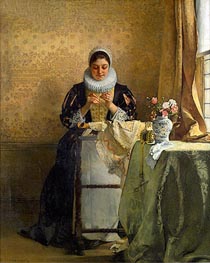
The Lace Maker n.d.
Oil Painting
$2529
$2529
Canvas Print
$74.70
$74.70
SKU: CHE-13421
Eduard Charlemont
Original Size: 99.8 x 81.3 cm
Private Collection
Eduard Charlemont
Original Size: 99.8 x 81.3 cm
Private Collection
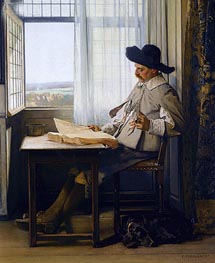
Austrian n.d.
Oil Painting
$1589
$1589
Canvas Print
$76.40
$76.40
SKU: CHE-13422
Eduard Charlemont
Original Size: 57 x 47.5 cm
Private Collection
Eduard Charlemont
Original Size: 57 x 47.5 cm
Private Collection